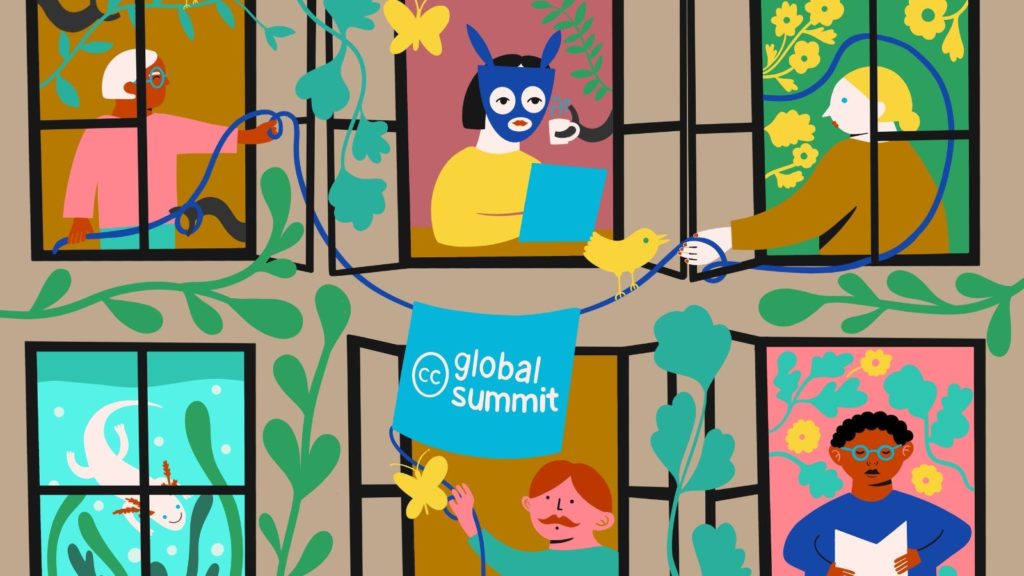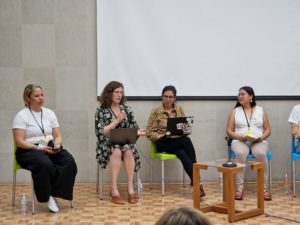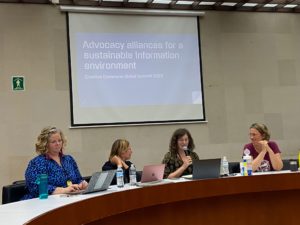The Future of Openness: IFLA at the Creative Commons Global Summit and what it means for libraries
10 October 2023

Creative Commons is an organisation that works to build and sustain a vibrant ecosystem of shared knowledge, information, and culture. Through their CC licenses and public domain tools, they equip creators and institutions with resources to open their educational and cultural material up for others to access, share, remix, and reuse.
Creative Commons believes that open access to knowledge and culture is required to solve the world’s greatest challenges. Across the programme of the 2023 Creative Commons Global Summit, held 3-6 October in Mexico City, links between the open movement, social justice, and sustainable development were emphasised
IFLA was excited to attend and contribute to CC’s conversation on the future of openness. The open movement provides opportunities for libraries to engage with and serve their users, as well as reach new users.
Read on for some key take-aways from the programme, and what they may mean for library advocacy going forward.
Towards a Recommendation on Open Culture (TAROC)
Creative Commons is leading an initiative that will hopefully culminate in the establishment of an international Recommendation on Open Culture, a companion to UNESCO’s recommendations on Open Education Resources and Open Science.
TAROC seeks to advance the declaration of cultural ministers at the 2022 UNESCO World Conference on Cultural Policies and Sustainable Development (Mondiacult), in which culture was recognised as a global public good.
Global public goods are by definition non-exclusive and not bound to economic gain. While the parameters of culture as a global public good are still the subject of much discussion, cultural institutions can act in the spirit of fostering a cultural commons by enabling their collections to be openly accessible, shareable, and reusable.
This initiative opens up a wealth of opportunities to advocate for the role of libraries and their collections in supporting the development of thriving knowledge societies. It also links cultural policy with information and digital rights policies – a place where the library field is well suited to act as key stakeholders.
Should all culture be open?
IFLA participated in several events at the CC Global Summit to further articulate the values of such a recommendation. In particular, an IFLA representative spoke in the panel, Traditional Knowledge and Traditional Cultural Expressions in Cultural Heritage Institutions.

Here, we amplified perspectives shared by Indigenous librarians, including key outcomes from the 2023 Satellite conference, Empire, Indigeneity, and colonial heritage collections: confronting difficult pasts, enabling just futures, organised by the Indigenous Matters and Rare Books and Special Collections Sections. We stressed that not all culture should necessarily be open, and that any considerations for cultural heritage by or about Indigenous communities must be approached following the CARE Principles for Indigenous Data Governance.
This means that use of such material must be for the collective benefit of the community to which it belongs, this community must retain the authority to control how the material is used, and users have the responsibility to demonstrate how their use will benefit the community, and that ethical use should keep Indigenous Peoples’ rights and wellbeing at its core.
As the TAROC project gains momentum, IFLA will continue to seek ways to integrate the perspectives of the library field into the developing document, with the goal of ensuring the result supports libraries and library professionals.
Artificial Intelligence
The theme of the 2023 CC Global Summit was “AI & the Commons”. Speakers across the agenda explored relationships between machine learning systems, generative AI, and the open movement, from creativity, to culture, research, employment, and beyond.
The conference brought together voices with an interest in both creation and access to information and creative works. IFLA spoke for the need to innovative in ways that enable creativity to work for, and be accessible by, humans.
Cooperation and Advocacy
IFLA was thrilled to be joined in Mexico City by national coordinators of the Knowledge Rights 21 (KR21) project, on which IFLA is a partner.

IFLA moderated a session on establishing advocacy alliances for a sustainable information environment. This session highlighted the need to proactively build advocacy capacity – stressing that partnerships can help fill capacity gaps and strengthen collective abilities to advocate for copyright reform.
But how do you know what you don’t know? The session spoke to the importance of self-evaluation as a first step, presenting KR21’s advocacy capacity grid as a tool to help organisations self-assess.
Interested in getting involved? Download the grid and begin identifying where you can develop your advocacy capacity.
IFLA is also a member of the Access to Knowledge (A2K) coalition, which seeks to advance copyright reform – including in areas related to AI – in support of human rights. A2K members presented on the ‘right to research’, and hosted a lunch to further advocacy alliances.
Open Climate
A final take-away from the CC Summit was an introduction to their work on ensuring climate data and research are open in order to further research and public knowledge. This is driven by the organisation’s affirmation that open access to knowledge and culture is required to solve the world’s greatest challenges.
CC’s new Open Climate Campaign seeks to ensure that research, data, educational resources, and software on the climate and biodiversity crises are open for all users. Notably, the campaign also acknowledges the role that open culture plays in addressing issues related to the climate crisis.
IFLA sees a clear overlap with our work in promoting the role of libraries, and documentary heritage collections, in empowering and informing climate action. It is important to have allies in this work, and we will continue to see where our campaigns can align in the future in order to strengthen our collective voice.
Get in touch:
Claire McGuire – Claire.mcguire@ifla.org
Matt Voigts – matt.voigts@ifla.org